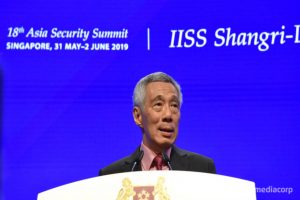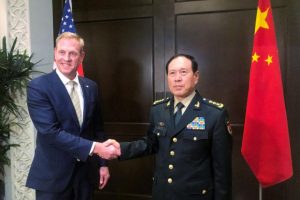
SINGAPORE: Diplomacy, not force – this is the overarching message of Singapore’s Prime Minister Lee Hsien Loong to China amid growing global concerns about reported militarisation of the South China Sea.
In a nuanced keynote speech at the 2019 Shangri-la Dialogue, Mr Lee also told defence ministers and strategic experts at Asia’s premier security forum that the ongoing US-China trade spat should not mislead the world into believing that the face-off between the two countries is a “strategic inevitability.” “To go down the present path would be a serious mistake on both sides,” he said here on May 31.
The View from Singapore & Southeast Asia

Warning against temptations to use force and coercive disputes to resolve issues like the South China Sea, Singapore’s long-serving leader advised China to respect international law to bolster its credentials as a responsible power.
“China should resolve these disputes peacefully, in accordance with international law, including UNCLOS (United Nations Convention on the Law of the Sea),” he said.
“It should do so through diplomacy and compromise rather than force or the threat of force, while giving weight to the core interests and rights of other countries,” he said.
The pursuit of diplomacy and dialogue, Singapore’s leader said, will enable China to build its reputation as “a responsible and benevolent power that need not be feared.” “Instead China will be respected as a power that can be relied on to support a stable and peaceful region.”
In a speech that was at once a critique of China’s expansionist militaristic moves in South China Sea and a tribute to China’s economic success, Mr Lee said that by following diplomacy, China will “benefit from a conducive and friendly international environment, and enhance its influence and standing in the world.”
“The rest of the world too has to adjust to a larger role for China,” he said, adding that China will have legitimate interests and ambitions, including the development of indigenously advanced technologies like infocomms and artificial intelligence.
“Countries have to accept that China will continue to grow and strengthen, and that it is neither possible nor wise for them to prevent this from happening.”
Against the backdrop of escalating tensions between the US and China, the major part of Mr Lee’s speech focused on the urgent imperative of finding mutual accommodation on part of the world’s two biggest economies.
The Views from US & China

This year’s Shangri-La Dialogue has been hogging headlines due to the participation of Acting US Secretary of Defence Patrick M. Shanahan and Chinese State Councilor and Minister of National Defense Wei Fenghe, the first high-level participation from China in almost a decade.
Over the weekend, the international strategic community will hear the two versions of the US-China spat from Washington and Beijing, and the way they look at the shifting dynamics in the Indo-Pacific and the world order.
In his speech on June 1, Mr Shanahan is expected to unveil Washington’s updated version of the Indo-Pacific and speak out strongly against reported attempts by China to alter the status quo in the disputed South China Sea. Like the previous editions, this year will also see the region rallying together to ensure freedom of navigation in the South China Sea.
Ahead of his much-anticipated speech, Mr Shanahan told reporters here that Chinese militarisation of the South China was “excessive” and that he would be calling out such Chinese actions in his June 1 presentation at the SLD 2019.
The SLD 2019 is taking place barely days after the U.S. Navy destroyer Preble sailed within 12 nautical miles of the disputed Scarborough Shoal in the South China Sea “in order to challenge excessive maritime claims and preserve access to the waterways as governed by international law
The defence chiefs of the US and China also held a bilateral meeting on the sidelines of the Shangri-la Dialogue on May 31. Pentagon described the meeting as “constructive and productive”, amid escalating tensions between world’s
Author Profile

- Manish Chand is Founder and Editor-in-Chief of India Writes Network (www.indiawrites.org) and India and World, a pioneering magazine focused on international affairs. He is CEO, Centre for Global India Insights, an India-based think tank focused on global affairs.
Latest entries
 India and the WorldFebruary 17, 2026South-by-South: Focus on people-centric solutions at India AI summit
India and the WorldFebruary 17, 2026South-by-South: Focus on people-centric solutions at India AI summit India and the WorldFebruary 7, 2026Modi hails interim India-US trade deal, Goyal says no concessions made on agriculture
India and the WorldFebruary 7, 2026Modi hails interim India-US trade deal, Goyal says no concessions made on agriculture India and the WorldFebruary 2, 2026Trump announces trade deal with India, Modi ‘delighted’
India and the WorldFebruary 2, 2026Trump announces trade deal with India, Modi ‘delighted’ India and the WorldJanuary 31, 2026Palestinian minister bats for mediatory role for India in ending Gaza conflict
India and the WorldJanuary 31, 2026Palestinian minister bats for mediatory role for India in ending Gaza conflict







